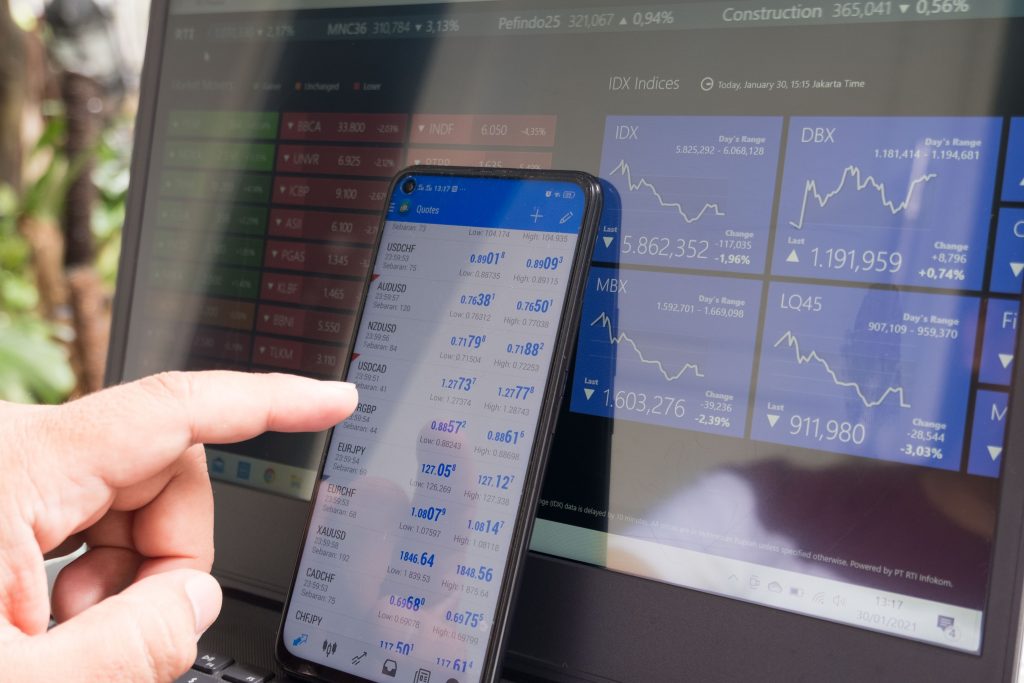The market for trading foreign currencies is known as foreign exchange trading, or forex trading or FX.
The world’s largest market, forex, influences everything from the cost of apparel purchased from China to the price you pay for a margarita while on vacation in Mexico.
The nightly financial news typically provides information about the currency exchange rate between the U.S. dollar and several foreign currencies, such as the euro and the British pound, and information about the stock and bond markets.
Trading in foreign exchange aims to make money off of changes in market exchange rates.
Although it carries a substantial risk, trading on the foreign currency market has the potential to yield enormous returns.
Here is a look at the basics of trading.
What is Forex?
Foreign exchange, or forex, is the process of converting one currency into another.
This procedure may be used for various objectives, such as business, tourism, and facilitating global trade.
Banks, companies, investment firms, hedge funds, and retail traders all use the forex market.
It is open 24 hours a day, five days a week for currency buying and selling.
Currency trading may be challenging and risky.
Rogue traders find it challenging to affect the value of a currency because of the system’s massive transaction flows.
Investors who have access to interbank dealing can benefit from this system’s contribution to market transparency.
Read: Who is a Forex Broker?

What is the Forex Market?
Currency exchange takes place on the foreign exchange market.
Innovative Tech Solutions, Tailored for You
Our leading tech firm crafts custom software, web & mobile apps, designed with your unique needs in mind. Elevate your business with cutting-edge solutions no one else can offer.
Start NowBecause they enable us to make local and international purchases of goods and services, currencies are crucial.
Foreign currency must be exchanged to engage in foreign trade and business.
Suppose you reside in Nigeria and want to purchase clothing from the United States.
In that case, you must pay the American for the clothing in U.S. dollars, either directly or through the retailer from whom you purchase the clothing (USD).
This implies that the importer from Nigeria would need to convert the same amount of Naira (NGN) into euros.
The same is true with travel. Nigerian tourists visiting Egypt cannot purchase tickets to the pyramids using Naira because that currency is not accepted there.
The visitor must convert their Naira at the current exchange rate for the local currency, in this case, the Egyptian pound.
One distinctive feature of this global market is the absence of a central exchange market.
Instead of taking place on a single centralized exchange, currency trading is carried out electronically over the counter (OTC).
This implies that all transactions occur via computer networks among traders worldwide.
The market is open twenty-four hours a day, six days a week.
Currency is traded globally in the major financial hubs of Frankfurt, Hong Kong, London, New York, Paris, Singapore, Sydney, Tokyo, and Zurich—across practically every time zone.
This implies that the currency market in Tokyo and Hong Kong opens fresh after the U.S. trading day.
As a result, the currency market can be very lively at any time, with continually shifting price quotes.
Read: Growth Investing: What is it and How to Start?
Forex Terms to Know
Every market uses a different language. Before trading forex, you should be familiar with the following terms:
- Currency pair. A currency pair is used in every forex transaction. Along with the majors, there are other, less popular trades (like exotics, which are currencies of developing countries).
- Pip. A pip, which stands for percentage in points, denotes the smallest price variation that can occur inside a currency pair. A pip is equal to 0.0001 since foreign exchange rates are quoted with at least four decimal places.
- Lot. A lot, or standardized unit of currency, is the unit of exchange used in forex trading. Although tiny (1,000) and mini (10,000) lots as well as the standard lot size of 100,000 units of currency are also available for trading.
- Bid-ask spread. The greatest amount that buyers are ready to pay for a currency (the bid) and the lowest amount that sellers need to sell for are what decide exchange rates, much like with other assets (like stocks) (the ask). The bid-ask spread is the difference between these two sums and the price at which deals will finally be performed.
- Leverage. Some traders might not be willing to risk as much money to execute a trade as a result of those huge lot sizes. Leverage, another word for borrowing money, enables traders to engage in forex trading without needing the necessary sum of cash.
- Margin. Leveraged trading isn’t free, though. Traders are required to make a deposit up front, or what is known as margin.
Read: Stock Investing Simplified: Boost Your Confidence and Returns
How Does Forex Trading Work?
Currency pairings, constantly traded in forex trading, are sets of two different currencies.
This is because everytime you purchase one currency, you must also sell another.
Each currency pair consists of two components.
The first currency given in the quote is the base currency, always equal to 1, and the second currency listed in the quote is the quote currency.
For example, let’s take a look at this currency pair:
GBP/EUR = 1.19
Here, the base currency is GBP (pound sterling) and the quote currency is EUR (euros). This means that £1 is worth 1.19 euros if you wanted to buy.
Seamless API Connectivity for Next-Level Integration
Unlock limitless possibilities by connecting your systems with a custom API built to perform flawlessly. Stand apart with our solutions that others simply can’t offer.
Get StartedA forex broker is used to trade currencies over the Internet.
From Sunday night until Friday night, the currency market is open 24 hours a day.
The price you pay for a currency pair when you buy it is known as the “ask,” and the amount you pay when you sell it is known as the “bid.”
Whether you are buying or selling, this price for the same currency pair will differ slightly.
These can initially be a little difficult to understand.
However, it is helpful to keep in mind that prices are always given from the perspective of the forex broker rather than your own.
When you sell a currency, prospective purchasers must submit a bid in the eyes of a broker.
You must also pay the seller’s asking price when you purchase currency.
Read: Investing in Foreign Stocks: Opportunities and Risks

What Moves the Forex Market
The supply and demand of buyers and sellers determine currency prices, just like they do in any other market.
However, this market is also influenced by other large-scale factors. Interest rates, central bank policies, the rate of economic growth, and the political climate in the nation in question can also impact the demand for specific currencies.
Because the forex market is active around the clock, five days a week, traders can respond to news that may not have an immediate impact on the stock market.
Traders must know the factors that could lead to sudden increases in currency values because speculation and hedging account for a large portion of currency trading.
Conclusion
In conclusion, forex trading is a dynamic and global marketplace driven by the constant flux of currency values.
Understanding the basics, such as currency pairs, leverage, and the bid-ask spread, is crucial for navigating this fast-paced environment.
While the potential for profit is significant, so are the risks, making it essential for traders to stay informed and strategic.
Whether you’re a seasoned trader or a newcomer, grasping the factors that influence the market—like economic indicators and geopolitical events—can position you for better decision-making and success in forex trading.
Before You Go…
Hey, thank you for reading this blog post to the end. I hope it was helpful. Let me tell you a little bit about Nicholas Idoko Technologies.
We help businesses and companies build an online presence by developing web, mobile, desktop, and blockchain applications.
We also help aspiring software developers and programmers learn the skills they need to have a successful career.
Take your first step to becoming a programming expert by joining our Learn To Code academy today!
Be sure to contact us if you need more information or have any questions! We are readily available.










